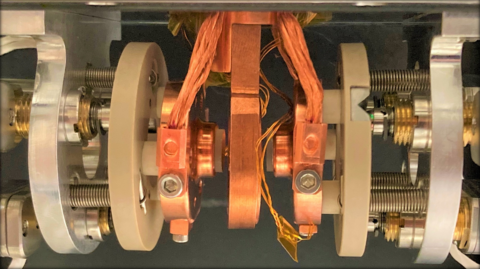Insulating metals – FAU researchers use optical cavities in order to control the electrical conductivity of materials
FAU researchers use optical cavities in order to control the electrical conductivity of materials
When materials are forced to interact with light, their properties can change fundamentally. In a study, researchers at FAU and the University of Trieste demonstrated that tantalum sulfide, a metallic quantum material, can be switched from an electrical conductor to an insulator in optical cavities. Since this process is reversible and can be controlled without contact, it opens up completely new perspectives in electronics, energy storage and quantum computing. The research team has published its findings in the journal “Nature”.
It’s a dream for every materials scientist: The ability to change the property of a material in such a way that it performs completely different functions. And all this within closed systems, as a reversible, precise process that can be controlled without contact.
Researchers from Germany, Italy and Slovenia have now come a major step closer to making this dream a reality. “We were able to manipulate tantalum sulfide, a quantum material with metallic properties, in such a way that it functions both as an electric conductor and insulator”, explains Prof. Dr. Daniele Fausti, Chair of Solid State Physics at FAU and associate professor of Materials Physics at the University of Trieste, Italy.
To do so, the research team uses something known as an optical cavity, which is a narrow space between two mirrors in which atoms and molecules are forced to interact with light. Optical cavities change the electromagnetic environment of a material and enable its properties to be precisely controlled without contact.
In an experiment with tantalum sulfide, a reversible transition between the insulating and metallic phase was achieved by mechanically adjusting the position of the mirrors surrounding the material. “The possibility of modulating the conductivity of a material in this way holds unforeseen potential for high-precision sensors and controlling electronic processes,” says Fausti.
Above all, this discovery could play an important role in the development of quantum technology as quantum chips have high conductivity, but are very susceptible to disruptions. If we can change the electromagnetic properties of components in quantum computers without contact, it would allow us to considerably simplify switching operations and reduce the influence of disruptive factors. It would also make the design of quantum computers more compact.
With their discovery, the researchers are also making advances in the field of superconducting materials, since several quantum technologies rely on superconductors that conduct electricity without losses. However, to do so, they need to be cooled to almost absolute zero, a complex process that requires large amounts of energy.
“Using optical cavities could be a means of turning quantum materials into superconductors at temperatures approaching room temperature,” explains Daniele Fausti. “We are very curious to conduct further research into this area during the next few years.”
Further information:
Prof. Dr. Daniele Fausti
Chair of Solid State Physics
Phone: +49 9131 85 28401
daniele.fausti@fau.de
